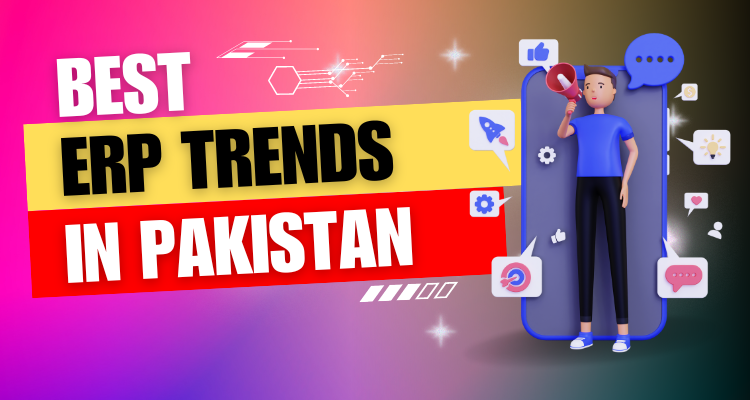
Enterprise Resource Planning (ERP), a business process management software, is revolutionizing the way businesses operate in Pakistan. This system allows organizations to use integrated applications to automate and manage their back-office functions. From small-scale startups to established corporations, the adoption of ERP is becoming widespread.
The key driver behind this shift is the multitude of benefits offered by cloud based ERP in Pakistan. This solution not only streamlines operations but also enhances efficiency, agility, and scalability. It enables real-time data access, fostering informed decision-making and strategic planning.
Let’s delve deeper into the top five ERP trends that are redefining the future of businesses in Pakistan. Each trend reflects how ERP systems are evolving to meet the dynamic needs of businesses and offering solutions that cater to their unique challenges.
Trend 1: Cloud-based ERP solutions
The first ERP trend that stands out is the shift towards cloud-based ERP in Pakistan. Companies are choosing cloud-based solutions over on-premise systems. The reason is simple. Cloud-based ERPs provide flexibility, scalability, and cost-effectiveness. Therefore, businesses looking to buy cloud-based ERP in Pakistan are making smart investments.
The adoption of cloud-based ERP solutions is not just a passing fad but a strategic move. It’s driven by the need for businesses to stay competitive in an increasingly digital marketplace. These solutions offer unparalleled accessibility, allowing employees to access data from anywhere, anytime. This remote access capability is particularly useful in today’s era where remote work and flexible work schedules are becoming the norm.
Trend 2: Mobile ERP
Next, we have mobile ERP. This ERP trend is gaining momentum as it enables employees to access crucial business data from anywhere. Consequently, it boosts productivity and enhances decision-making processes.
With mobile ERP, users can easily create, access and share business information through handheld mobile devices. This ensures real-time access to data, a critical aspect in making timely and informed decisions. Furthermore, the rise of mobile ERP apps also paves the way for better collaboration among team members. Information can be shared quickly and efficiently, leading to improved communication and teamwork.
Trend 3: Emphasis on user experience
The importance of user experience in ERP systems cannot be overstated. Companies are increasingly recognizing that an intuitive and user-friendly interface is crucial for efficient operations. As a result, they are investing more in designing ERP systems that are not only robust in functionality but also easy to navigate and use.
User experience encompasses several elements in an ERP system. It includes the layout of the system, ease of navigation, clarity of information, and the simplicity of performing tasks. A well-designed user interface can significantly reduce the time taken to perform tasks. It can also reduce the need for extensive training, as employees can intuitively understand how to use the system.
Trend 4: Integration of AI and IoT
The integration of Artificial Intelligence (AI) and the Internet of Things (IoT) in ERP systems is indeed an ERP trend that’s taking Pakistan’s business realm by storm. These cutting-edge technologies are redefining how businesses operate, offering an array of benefits that go beyond traditional ERP capabilities.
AI, with its ability to mimic human intelligence, brings automation and predictive analysis to ERP systems. It can automate routine tasks such as data entry and invoice processing, freeing up staff to focus on more strategic initiatives. Furthermore, AI’s predictive capabilities can analyze patterns in data, forecast trends, and aid in proactive decision-making.
On the other hand, IoT technology connects physical devices with internet connectivity, enabling them to communicate and exchange data. When integrated with ERP systems, IoT provides real-time visibility into operations. For instance, sensors on manufacturing equipment can send alerts to the ERP system when maintenance is required, minimizing downtime.
Trend 5: Increased security measures
In the wake of increasing cyber threats, businesses in Pakistan are prioritizing the security of their ERP systems more than ever. With valuable data at stake, companies are not just relying on basic security protocols but are integrating advanced security measures into their ERP systems.
The increase in remote working arrangements has further accentuated the need for stringent security measures. Employees accessing company data from various locations and devices pose a new set of security challenges. To counter this, businesses are implementing multi-factor authentication, data encryption, and regular system audits to ensure secure access to ERP systems.
Comparing cloud-based ERP options in Pakistan
When it comes to comparing cloud-based ERP options in Pakistan, there are several factors to consider. These include cost, functionality, scalability, and user-friendliness. It’s essential to choose a solution that aligns with your business needs and goals.
Conclusion
Benefits of cloud based ERP in Pakistan cannot be denied. The ERP trends in Pakistan are evolving rapidly, making it imperative for businesses to stay updated. By embracing these trends, companies can streamline their operations, make informed decisions, and drive growth. So, if you haven’t already, it’s time to explore the benefits of cloud-based ERP in Pakistan.
Remember, choosing the right ERP system can be a game-changer for your business. So, take your time, do your research, and make an informed decision. After all, the future of your business depends on it.
